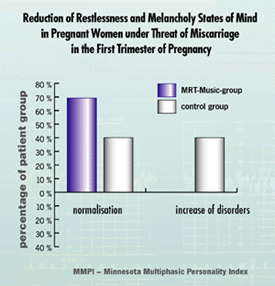The reasons for the danger reached from environmentally caused stress situations over nervous mental tensions up to hormonal deficiencies. On average the patients were 23 years old (±3,1). For seven of the women it was their first pregnancy, eight were pregnant for the second time.
On average the initial mental profile of the women was characterized by the emotional states of restlessness and melancholy which became obvious in a raise of the scales 1, 2 and 7 of the Minnesota Multiphasic Personality Inventory (MMPI).
Medical Resonance Therapy Music®
Group
For 8-10 days 15 patients received every day for 30-60 minutes a treatment with the Medical Resonance Therapy Music® via compact disc and headphone and received no other treatment.
Evaluating the MMPI a healing effect of the MRT-Music® could be documented in 14 out of 15 pregnant women. The improvement in the mood and the general state stood at 87% of the reports. At the end of the treatment with the MRT-Music® the mental state of 69,2% of the women was normal again; there was no incidence of a deterioration in the mental state.
Control GroupFor 8-10 days 15 patients received every day for 30-60 minutes a treatment with the Medical Resonance Therapy Music® via compact disc and headphone and received no other treatment.
Evaluating the MMPI a healing effect of the MRT-Music® could be documented in 14 out of 15 pregnant women. The improvement in the mood and the general state stood at 87% of the reports. At the end of the treatment with the MRT-Music® the mental state of 69,2% of the women was normal again; there was no incidence of a deterioration in the mental state.
In this group 15 women did not listen to MRT-Music® but received hormone drugs, sedatives, spasmolytica and physiotherapy. At the end of the traditional treatment the mental state had normalized in 40% of the women. In further 40% though an increase of the disorders took place.
Investigators:
Prof. Dr. med. G. Gerassimowitsch
Prof. Dr. med. Walentina Sidorenko
Dr. med. Margarita Gawrisch
Dr. med. Tatjana Teterkina
Dr. med. Sergej Korotkow

